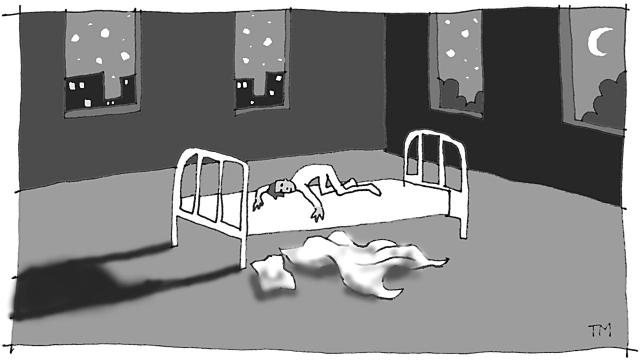Abstract
Background: Settling and night waking problems are particularly prevalent, persistent, and generally considered difficult to treat in children with a learning disability, although intervention trials are few. Scarce resources, however, limit access to proven behavioural treatments.
Aims: To investigate the efficacy of a media based brief behavioural treatment of sleep problems in such children by comparing (1) face-to-face delivered treatment versus control and (2) booklet delivered treatment versus controls.
Methods: The parents of 66 severely learning disabled children aged 2–8 years with settling and/or night waking problems took part in a randomised controlled trial with a wait-list control group. Behavioural treatments were presented either conventionally face-to-face or by means of a 14 page easy to read illustrated booklet. A composite sleep disturbance score was derived from sleep diaries kept by parents.
Results: Both forms of treatment were almost equally effective compared with controls. Two thirds of children who were taking over 30 minutes to settle five or more times per week and waking at night for over 30 minutes four or more times per week improved on average to having such settling or night waking problems for only a few minutes or only once or twice per week (H = 34.174, df = 2, p<0.001). These improvements were maintained after six months.
Conclusions: Booklet delivered behavioural treatments for sleep problems were as effective as face-to-face treatment for most children in this population.
Full Text
The Full Text of this article is available as a PDF (223.1 KB).
Figure 1 .
Flow of participants through the study.
Selected References
These references are in PubMed. This may not be the complete list of references from this article.
- Chavin W., Tinson S. The developing child: children with sleep difficulties. Health Visit. 1980 Nov;53(11):477–480. [PubMed] [Google Scholar]
- Concato J., Peduzzi P., Holford T. R., Feinstein A. R. Importance of events per independent variable in proportional hazards analysis. I. Background, goals, and general strategy. J Clin Epidemiol. 1995 Dec;48(12):1495–1501. doi: 10.1016/0895-4356(95)00510-2. [DOI] [PubMed] [Google Scholar]
- France K. G., Hudson S. M. Behavior management of infant sleep disturbance. J Appl Behav Anal. 1990 Spring;23(1):91–98. doi: 10.1901/jaba.1990.23-91. [DOI] [PMC free article] [PubMed] [Google Scholar]
- Hossain Jamil L., Shapiro Colin M. The prevalence, cost implications, and management of sleep disorders: an overview. Sleep Breath. 2002 Jun;6(2):85–102. doi: 10.1007/s11325-002-0085-1. [DOI] [PubMed] [Google Scholar]
- Jones D. P., Verduyn C. M. Behavioural management of sleep problems. Arch Dis Child. 1983 Jun;58(6):442–444. doi: 10.1136/adc.58.6.442. [DOI] [PMC free article] [PubMed] [Google Scholar]
- Marrs R. W. A meta-analysis of bibliotherapy studies. Am J Community Psychol. 1995 Dec;23(6):843–870. doi: 10.1007/BF02507018. [DOI] [PubMed] [Google Scholar]
- Morris S., James-Roberts I. S., Sleep J., Gillham P. Economic evaluation of strategies for managing crying and sleeping problems. Arch Dis Child. 2001 Jan;84(1):15–19. doi: 10.1136/adc.84.1.15. [DOI] [PMC free article] [PubMed] [Google Scholar]
- Murphy P. W., Chesson A. L., Walker L., Arnold C. L., Chesson L. M. Comparing the effectiveness of video and written material for improving knowledge among sleep disorders clinic patients with limited literacy skills. South Med J. 2000 Mar;93(3):297–304. [PubMed] [Google Scholar]
- Quine L. Sleep problems in children with mental handicap. J Ment Defic Res. 1991 Aug;35(Pt 4):269–290. doi: 10.1111/j.1365-2788.1991.tb00402.x. [DOI] [PubMed] [Google Scholar]
- Ramchandani P., Wiggs L., Webb V., Stores G. A systematic review of treatments for settling problems and night waking in young children. BMJ. 2000 Jan 22;320(7229):209–213. doi: 10.1136/bmj.320.7229.209. [DOI] [PMC free article] [PubMed] [Google Scholar]
- Simonds J. F., Parraga H. Prevalence of sleep disorders and sleep behaviors in children and adolescents. J Am Acad Child Psychiatry. 1982 Jul;21(4):383–388. doi: 10.1016/s0002-7138(09)60942-0. [DOI] [PubMed] [Google Scholar]
- Wiggs L., Stores G. Behavioural treatment for sleep problems in children with severe learning disabilities and challenging daytime behaviour: effect on sleep patterns of mother and child. J Sleep Res. 1998 Jun;7(2):119–126. doi: 10.1046/j.1365-2869.1998.00107.x. [DOI] [PubMed] [Google Scholar]
- Wiggs L., Stores G. Severe sleep disturbance and daytime challenging behaviour in children with severe learning disabilities. J Intellect Disabil Res. 1996 Dec;40(Pt 6):518–528. doi: 10.1046/j.1365-2788.1996.799799.x. [DOI] [PubMed] [Google Scholar]



